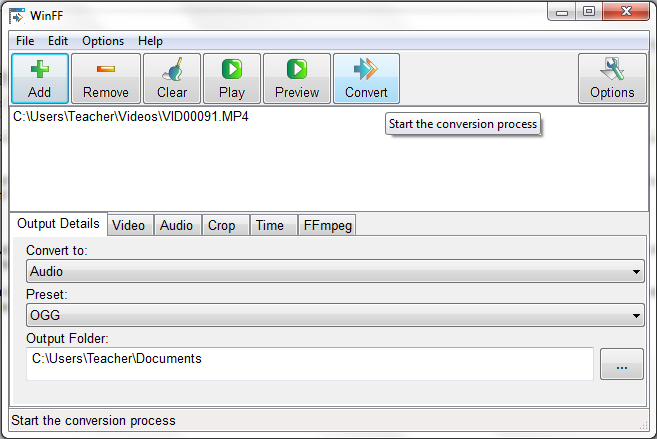The problem:
Our students had recorded video of themselves, but the audio from the video was too quiet to hear. Unfortunately, they had recorded their video on a Flip camera from a distance of 7 or 8 metres in a large open space, and forgot (or did not know) that this would result in extremely poor audio.
A solution:
We don’t have the kind of video editing software readily available for students that would fix this kind of problem (I think our film course has access to Final Cut Pro), so I wanted to find a free solution for fixing this audio.
I found WinFF, which is an open source video conversion tool, which happily converts from a video to audio, essentially isolating the audio from a video file. I downloaded it, and installed it to my computer. After some experimentation, which I did with the students, I discovered that the following settings worked best for this process.

I then imported this audio into Audacity, and used the volume adjustment option (see below) to increase the volume of the audio track of the video.

Once the audio volume was adjusted, I then imported the video and the new audio track into Windows Live Movie Maker, where we muted the original video, and used the new enhanced audio track. Queue the excited students who no longer have to re-record their video!
The follow-up problem:
This is essentially a magic tech recipe that the students may be able to reproduce, but I doubt they will be much better at trouble-shooting their own tech problems in the future. As I outlined the solution for the small group of students I was working with, some of them were interested, others were not. They displayed many of the signs I see when I see math taught the wrong way. They have no idea what the OGG audio format is, or why it would be the best choice to work with Audacity.
Questions:
- How can we make learning technology more seamless? I see technology as a tool for other activities, but some of our current technologies are so difficult to work with that something which should be simple (increasing volume of a video) is difficult.
- Is is better not to help these students in the long run when the task they want to do is beyond their current technology skills? Is there a reasonable balance we should strike between assisting students finishing the project today, and helping students become more independent tomorrow?
- How is this related to mathematics education today? How often do we help students solve fabulous open-ended problems with magical mathematics techniques they don’t really understand?
Alfonso Gonzalez says:
Your questions make me wonder. How much tech is enough? Some kids/adults may be so motivated by a problem that they’ll find solutions on their own. But how many kids/adults will ask for or seek help? As with any subject/topic not everyone will be motivated to become proficient. So how much tech, or Math, or Science is enough to help them be happy, successful adults in the future. That is the question I continually ask myself.
April 24, 2012 — 12:27 am
David Wees says:
It’s a good question to be concerned about. It’s much akin to the question, "What is the purpose of education?" which rarely gets the same answer out of more than one group of people.
April 24, 2012 — 12:44 am